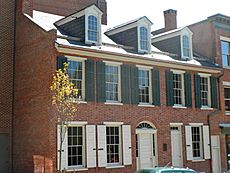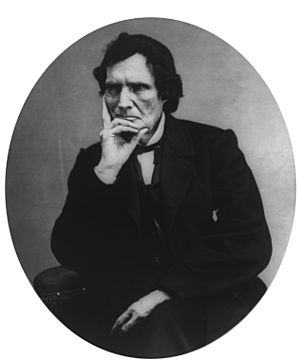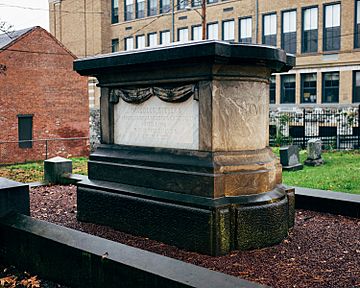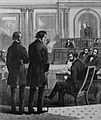Thaddeus Stevens facts for kids
Quick facts for kids
Thaddeus Stevens
|
|
|---|---|
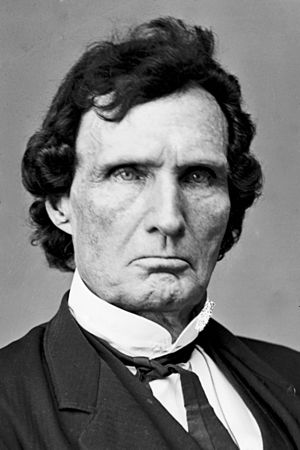 |
|
| Member of the U.S. House of Representatives from Pennsylvania |
|
| In office March 4, 1859 – August 11, 1868 |
|
| Preceded by | Anthony Roberts |
| Succeeded by | Oliver Dickey |
| Constituency | 9th district |
| In office March 4, 1849 – March 3, 1853 |
|
| Preceded by | John Strohm |
| Succeeded by | Henry A. Muhlenberg |
| Constituency | 8th district |
| Chair of the House Ways and Means Committee | |
| In office March 4, 1861 – March 3, 1865 |
|
| Preceded by | John Sherman |
| Succeeded by | Justin Smith Morrill |
| Chair of the House Appropriations Committee | |
| In office December 11, 1865 – August 11, 1868 |
|
| Preceded by | Position established |
| Succeeded by | Elihu B. Washburne |
| Personal details | |
| Born | April 4, 1792 Danville, Vermont, U.S. |
| Died | August 11, 1868 (aged 76) Washington, D.C., U.S. |
| Political party | Federalist (before 1828) Anti-Masonic (1828–1838) Whig (1838–1853) Know Nothing (1853–1855) Republican (1855–1868) |
| Domestic partner | Lydia Hamilton Smith (1848–1868) |
| Education | University of Vermont Dartmouth College (BA) |
| Signature | |
| Nicknames | The Old Commoner The Great Commoner |
Thaddeus Stevens (April 4, 1792 – August 11, 1868) was an important American politician from Pennsylvania. He served in the United States House of Representatives. Stevens was a key leader of the Radical Republicans during the 1860s. This group strongly opposed slavery and unfair treatment of Black Americans.
Stevens worked hard to protect the rights of newly freed people after the American Civil War. He often disagreed with President Andrew Johnson during the time known as Reconstruction. As chairman of the House Ways and Means Committee during the Civil War, he helped manage the government's money. He focused on winning the war, paying for it with new taxes, and ending slavery forever.
Contents
Early Life and Education
Thaddeus Stevens was born in Danville, Vermont, on April 4, 1792. He was the second of four boys. He was named after a Polish general who helped in the American Revolution. Thaddeus was born with a club foot, which made walking difficult. His older brother also had this condition.
His father, Joshua Stevens, was a farmer and shoemaker. He left the family when Thaddeus was young. His mother, Sarah, worked hard to support her sons. She wanted them to get a good education. In 1807, she moved the family to Peacham, Vermont. Thaddeus went to Caledonia Grammar School there. He was often teased because of his disability. Despite this, he was determined to learn.
Stevens later attended the University of Vermont. His studies were interrupted by the War of 1812. He then went to Dartmouth College in New Hampshire. He did very well in his classes. After graduating in 1814, he taught for a short time. He also began to study law. In 1815, he moved to York, Pennsylvania, to teach and continue his law studies.
Political Career and Beliefs
Stevens quickly became a successful lawyer in Gettysburg. He became interested in local government and then in politics. He was a strong leader in the Anti-Masonic Party. This party believed that secret groups like Freemasonry were a threat to democracy.
He was elected to the Pennsylvania House of Representatives. There, he strongly supported free public education for everyone. In 1842, he moved his home and law practice to Lancaster. He joined the Whig Party and was elected to Congress in 1848. His strong views against slavery made him lose some support. He did not run for re-election in 1852.
After a brief time with the Know-Nothing Party, Stevens joined the new Republican Party. He was elected to Congress again in 1858. He became a leading voice against the spread of slavery. He also opposed any compromises with the Southern states as the Civil War approached.
American Civil War and Slavery
When the Civil War began in April 1861, Stevens believed the Southern states were rebels. He argued they had lost their rights under the U.S. Constitution by starting a war. He felt that slavery should not exist in a reunited America. As chairman of the House Ways and Means Committee, he had great power in Congress.
In July 1861, Stevens helped pass a law to take property, including enslaved people, from certain rebels. He also proposed a resolution to free all enslaved people. This idea was not approved at first. However, laws were passed to end slavery in Washington, D.C. and in U.S. territories.
Stevens and other Radical Republicans wanted President Abraham Lincoln to free all enslaved people faster. Lincoln moved more slowly, but both wanted to end slavery. Lincoln eventually issued the Emancipation Proclamation in September 1862. This declared many enslaved people free. Stevens used this in his re-election campaign.
During the war, Confederate soldiers looted and damaged Stevens's iron forge in Pennsylvania. This caused him a great financial loss.
Stevens strongly pushed for a constitutional amendment to abolish slavery everywhere. The Emancipation Proclamation was a wartime order and might not last. An amendment would end slavery permanently. The Thirteenth Amendment passed Congress in January 1865. It outlawed slavery and forced labor, except as punishment for a crime. Stevens believed this amendment should also lead to economic fairness for Black Americans.
Congress also created the Freedmen's Bureau. This agency was meant to help newly freed people. It aimed to set up schools and give land to former enslaved families.
Paying for the War
Stevens worked closely with Lincoln's government to fund the war. He quickly helped pass laws for war loans and to pay soldiers. He used strict rules in the House to pass these bills quickly.
He played a big part in the Legal Tender Act of 1862. This law allowed the U.S. government to print paper money not backed by gold or silver. This was new for the country. In 1863, he helped pass the National Banking Act. This law created a system where banks had to hold federal bonds. This system helped stabilize the country's money for many years.
Reconstruction Era
After the war, the country faced the challenge of rebuilding the South. Stevens believed the Southern states needed big changes. He and other radicals thought these states should be treated like conquered areas. President Lincoln, however, wanted a more forgiving approach.
After Lincoln was assassinated in April 1865, Andrew Johnson became president. Johnson wanted to quickly bring the Southern states back into the Union. He did not focus on protecting the rights of freed slaves. This caused a major conflict between Johnson and Stevens, who led the Radical Republicans in Congress.
Stevens argued that no Southern representatives should be allowed back into Congress. He believed this would give Congress power to force changes for racial equality. In a speech, he suggested taking land from large Southern landowners. He wanted to give some of this land to newly freed people.
Southern states held elections that only white people could vote in. They chose many former Confederate leaders for Congress. They also passed "Black Codes." These laws took away many civil rights from Black Americans. This made many Northerners angry and turned public opinion against President Johnson's plans.
Congress Takes Control
In 1865, Stevens became Chairman of the House Committee on Appropriations. This gave him control over what laws the House would discuss. He focused on laws to protect the freedom of Black Americans. He helped create the Joint Committee on Reconstruction. This committee investigated conditions in the South. It heard about violence against Black Americans and Union supporters.
The Committee of Fifteen worked on what became the Fourteenth Amendment. This amendment aimed to give equal rights and protections to all citizens. Stevens supported it, even though he felt it was not as strong as he wanted. He believed that land and a home were more important for Black Americans than just the right to vote.
Congress passed the Civil Rights Act of 1866. This law made Black Americans citizens and gave them equal rights under the law. President Johnson tried to stop this law, but Congress passed it anyway. Johnson then accused Stevens and other leaders of trying to destroy the government.
In 1867, Stevens introduced a law to divide the South into five military districts. Army generals would oversee elections there. All men, regardless of race, could vote, except for former Confederates. States had to write new constitutions and ratify the Fourteenth Amendment to rejoin the Union. This system gave power to a mix of freedmen, Northerners who moved South, and cooperative Southerners.
Stevens also helped pass a law allowing Black men to vote in Washington, D.C. He supported railroads and wanted them to use American-made iron. He also tried to pass laws to protect workers and give government employees raises.
Final Months and Legacy
Thaddeus Stevens passed away on August 11, 1868. His body was brought to the United States Capitol rotunda. He was only the third person to lie in state there, after Henry Clay and Abraham Lincoln. Both white and Black people served as pallbearers and guards of honor. Thousands of mourners, of all races, came to pay their respects.
He was buried in Shreiner's Cemetery in Lancaster. This cemetery allowed people of all races to be buried there. His former student, Oliver J. Dickey, was elected to take his place in Congress.
Personal Life
Stevens never married. He had a long relationship with his housekeeper, Lydia Hamilton Smith. She was a light-skinned African-American woman. She was with him when he died, along with his nephew and other friends. Stevens left money to Lydia in his will. She used it to buy his house, where she had lived for many years.
Stevens also took care of his two young nephews, Thaddeus Jr. and Alanson Joshua Stevens, after their parents died.
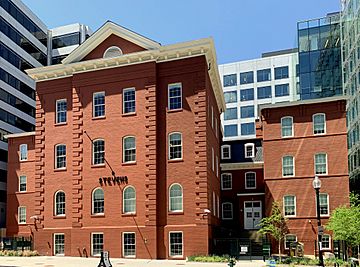
The Thaddeus Stevens Elementary School in Washington, D.C., was named after him. It was founded in 1868 as the first school built for African-American children there.
Stevens was known for his clever and sometimes sarcastic humor. When asked for a lock of his hair, he famously took off his wig and offered it to the admirer.
In 2012, the film Lincoln brought new attention to Thaddeus Stevens. He was played by Tommy Lee Jones in the movie. In 2022, a statue of Stevens was unveiled in Gettysburg, Pennsylvania, to celebrate his 230th birthday.
See also
 In Spanish: Thaddeus Stevens para niños
In Spanish: Thaddeus Stevens para niños
Images for kids
-
Color print of a Harper's Weekly woodcut showing Stevens speaking to the House in 1868.
-
Illustration from Harper's Weekly of Stevens (right) and John A. Bingham telling the Senate about President Johnson's impeachment.
-
Johnson impeachment managers. Seated L-R: Benjamin Butler, Stevens, Thomas Williams, John Bingham; Standing L-R: James F. Wilson, George S. Boutwell, John A. Logan.
 | Calvin Brent |
 | Walter T. Bailey |
 | Martha Cassell Thompson |
 | Alberta Jeannette Cassell |


